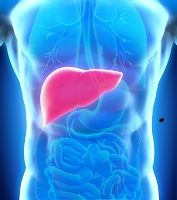Article
Race Not a Factor in Hepatitis C Survival
Author(s):
African Americans are more likely to be infected with the hepatitis C virus than Caucasians. But that does not mean they are more likely to die from the disease, researchers reported at the 2015 Digestive Disease Week conference in Washington, DC.

People who have hepatitis C infection face a risk of developing liver disease, including cirrhosis and cancer. African Americans are more like to be infected with the virus than Caucasians.
But that does not mean they are more likely to die, a Detroit team reported at the 2015 Digestive Disease Week conference in Washington, DC.
Aaron Stubbs, MD, and colleagues at Wayne State University School of Medicine in Detroit, MI looked at a database of 3,727 patients with chronic hep C infection seen in their gastrointestinal clinic between 1995 and 2008.
They then looked at the Social Security Administration’s national death index to see which patients were likely still alive.
They found 871 patients had been reported dead.
The majority of patients in the cohort had not been treated (2,680) and if they had been treated they had received interferon not direct-acting antivirals.
Comparing by race they found that African Americans and Caucasians had similar percentages of deaths among those included in the study group. That death-report rate in the Social Security database was 23% in the African American group of patients and 22% in the Caucasians.
aspartate aminotransferase,
A better indicator of mortality in these patients was whether they had fibrosis detected by biopsy at their first visi to the clinic. Similar results were found for liver-relevant serum parameters, such as platelets and albumin.
When multivariate analysis was used to assess independence of the predictive factors, cirrhosis was the dominant independent factor.
Patients who got the interferon treatment were more likely to survive than patients who were not. According to the database, 5% died in each racial group vs. 26% of the untreated Caucasians to 27% of the untreated African Americans.
“This study demonstrates that race is not a factor in mortality and that mortality is related to the severity of hepatitis C virus liver disease at first visit,” the researchers concluded.
The research was partly supported by Gilead Sciences.



